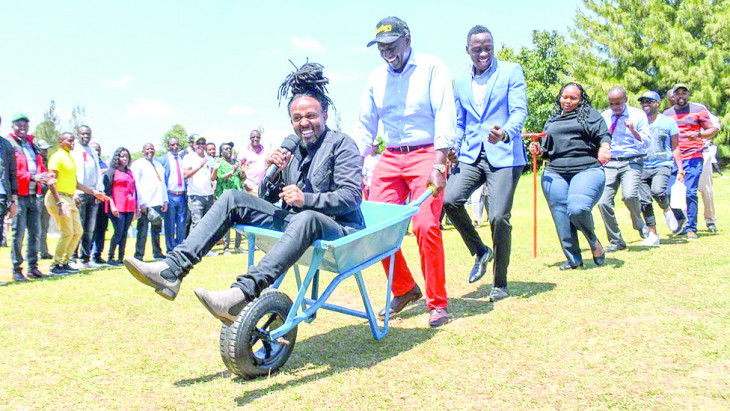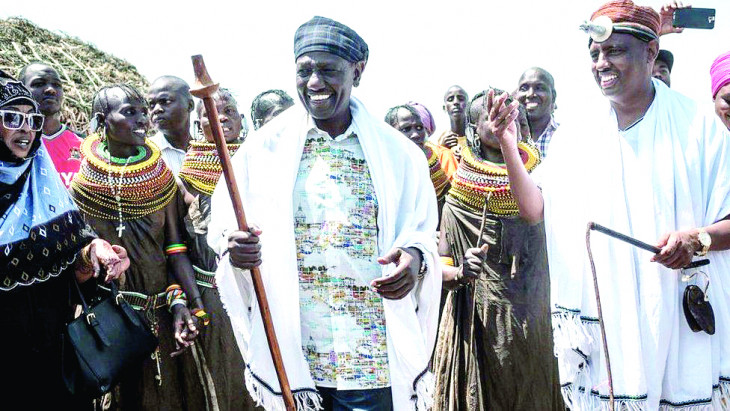Ruto’s long journey: From poultry seller to president
By BBC, August 16, 2022President-elect William Ruto’s childhood epitomises the lives of many poor Kenyans.
He went to primary school barefoot, wearing his first pair of shoes at the age of 15. He also sold chicken and groundnuts by the roadside in his rural area in the Rift Valley region.
So it comes as no surprise that the president-elect portrayed himself as the champion of the poor when he campaigned for the presidency ahead of the Tuesday election, whose results were announced yesterday by the Independent Electoral and Boundaries Commission chair Wafula Chebukati at the Bomas of Kenya, Nairobi.
Ruto, who garnered a total of 7,176,141 votes (representing 50.49 per cent of the total votes cast), was contesting the election under the banner of Kenya Kwanza with a promise to grow the economy.
His closest rival in the election Raila Odinga of the Azimio-One Kenya coalition managed 6,942,930 votes, translating to 48.85 per cent. Other contestants were George Wajackoyah of the Roots Party (61,969 votes, 0.44 per cent) and David Mwaure of the Agano Party with 31,987 votes, a 0.23 per cent.
The official rate of unemployment among the youth is nearly 40 per cent, and the economy is not creating enough jobs to absorb the 800,000 young people joining the workforce every year.
Ruto, therefore, coined the phrase “Hustler nation” to refer to the youth struggling to make ends meet. He has promised a bottom-up approach to the economy, saying it will benefit the poor who are bearing the brunt of the cost of living crisis that has hit the world following the coronavirus pandemic and the war in Ukraine.
The 55-year-old Ruto was contesting the presidency for the first time after serving as President Uhuru Kenyatta’s deputy for 10 years since 2013. He was hoping for the same luck that saw him elected, at his first attempt, to parliament in 1997 as MP for the Eldoret North.
He joined politics in 1992, having been mentored, he says, by then-President Daniel arap Moi. Ruto was part of the youth wing of Moi’s once-dominant Kanu party and was among the activists tasked with mobilising voters for the first multi-party elections the same year.
He has the reputation of being a powerful orator who drew huge crowds at rallies and of putting up a strong performance in media interviews. He often starts speaking by saying “My friend”, which he used to help him strike a rapport with voters and disarm critics.
After holding various ministerial posts—including Education and Agriculture—he rose to the DP position in 2013. Ruto contested the election as the running mate of outgoing President Uhuru, shocking many as they had been on opposite sides of the political spectrum in the previous election.
It was an alliance of expediency, as both had been charged by the International Criminal Court with crimes against humanity after being accused of fuelling violence in the aftermath of the heavily disputed 2007 election, in which about 1,300 people were killed. In that poll, Ruto had backed opposition candidate Raila while Uhuru backed then President Mwai Kibaki in his re-election bid.
Ruto and Uhuru’s alliance, dubbed a bromance, paid off as the two men swept to power, putting them in a strong position to stave off the threat posed to them both by the ICC—something they achieved when the prosecution dropped charges against Uhuru in 2014 and judges threw out the case against Ruto in 2016.
However, their alliance broke in 2018, when Uhuru—in yet another stunning about-turn—reconciled with Raila, dashing Ruto’s hopes that the outgoing president would endorse him as his successor in the current election campaign. The president’s allies accused Ruto of insubordination, an allegation he denied, but he acknowledged the rift by saying that he and the president “see politics differently”.
Ruto remains in office, courtesy of constitutional provisions that secure the tenure of a deputy president.

PD/FILE
Ethnic loyalties play a huge role in Kenyan politics and Ruto comes from the third biggest ethnic group, the Kalenjin, which produced the longest-serving president, Moi.
Ruto is married to Rachael, who he first met at church youth meetings. They have six children. Their eldest son, Nick, was once blessed by Kalenjin elders, fuelling speculation that he was being groomed for a political role, while their daughter, June, works in the Foreign Affairs ministry.
Ruto has a passion for agriculture, which has seen him venture into maize, dairy and poultry farming. He owns huge parcels of land in western and coastal Kenya and has also invested in the hospitality industry.
